On the afternoon of September 3, 2022, Mr. Tian Feng, Secretary General of China of the Technology for Sustainable Development Goals Alliance in Asia (Tech4SDG), participated in the "China-Singapore AI Ecosystem Collaboration Forum: AI for Good and AI Unicorn Dialogue".
In the forum, Mr. Tian Feng and Dr. James Ong, Secretary General of Singapore the Tech4SDG, jointly launched the following 3 output:
1.“Digital Transformation for Balanced Development in Asia – Technology for Sustainable Development in Asia (2022-2023)” report,
2."Excellent Cases of Science and Technology Promoting SDGs Awards 2022", and
3."Asia Science and Technology for Sustainable Development Goals - Shanghai Initiative ".
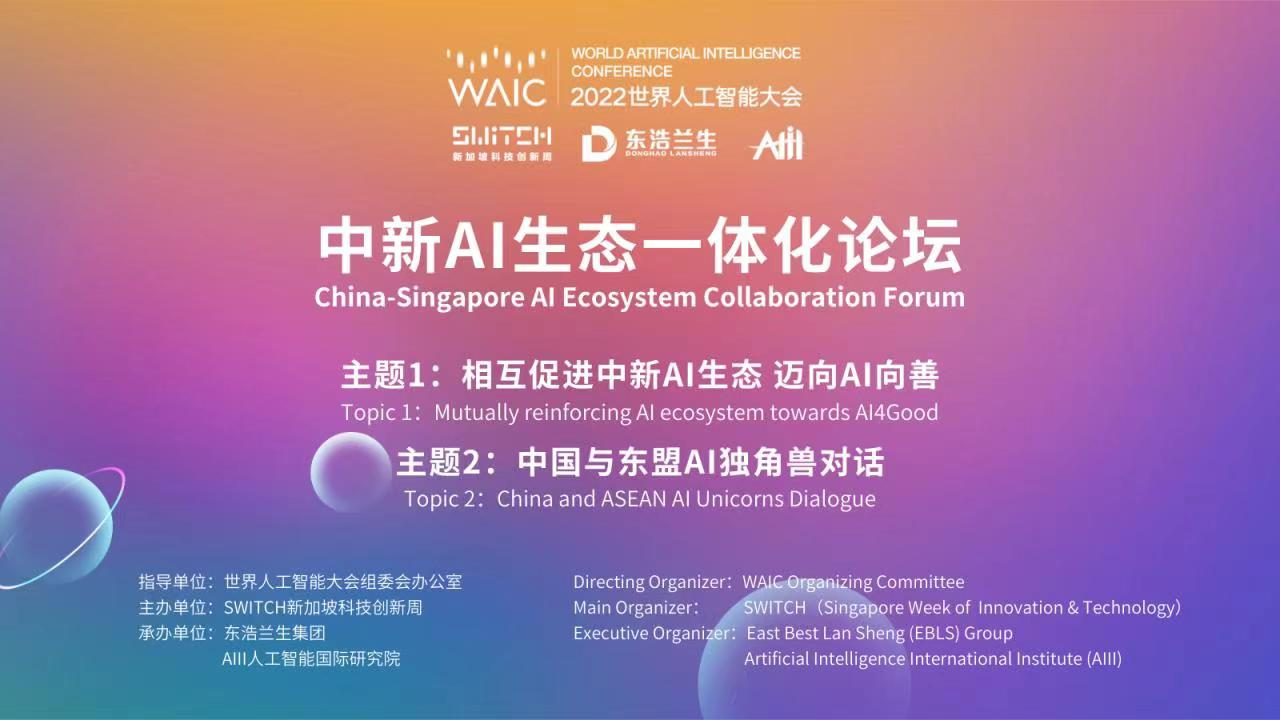
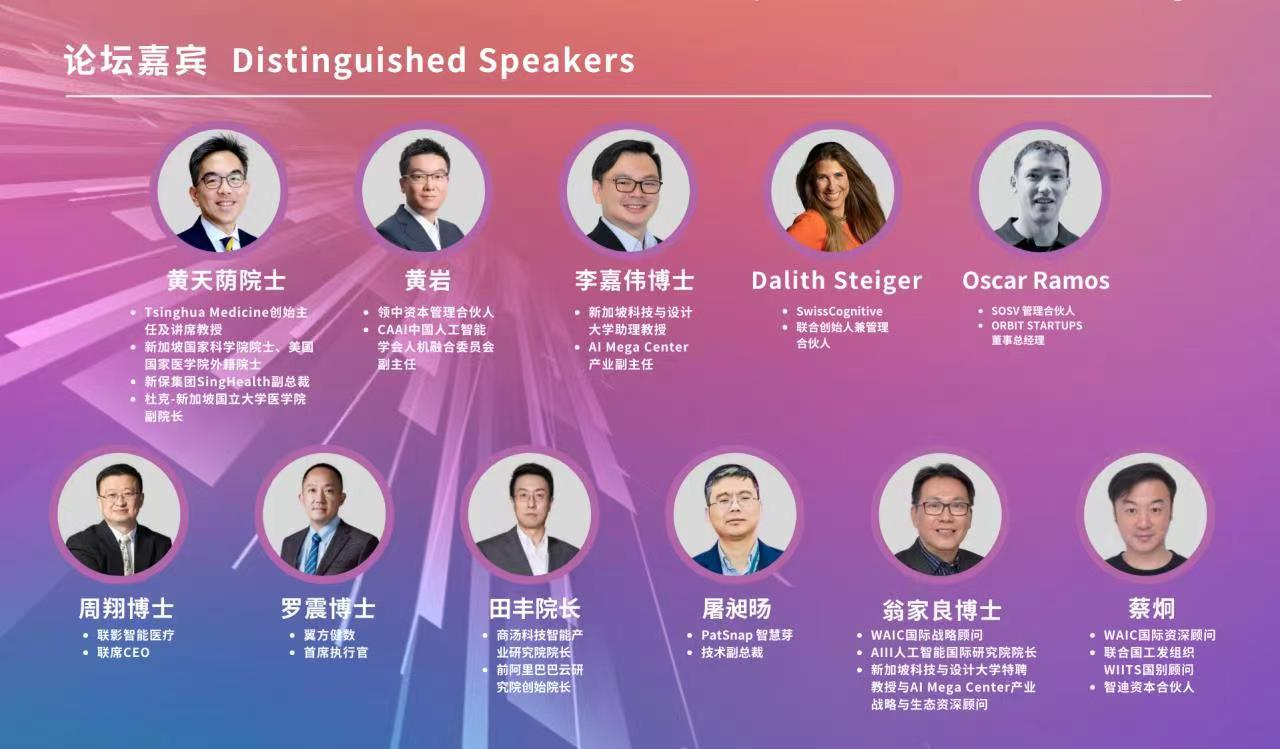
Figure: WAIC 2022 China-Singapore AI Ecosystem Collaboration Forum Speakers
The Tech4SDG has collected the "Excellent Cases of Science and Technology Promoting SDGs" from the Asian region. After the International Advisory Committee's evaluation, nine cases have been selected with the most representative and replicable value to effectively promote the 17 United Nations Sustainable Development Goals, especially the seven major goals prioritized in Asia: SDG3 (Good Health and Well-being), SDG4 (Quality Education), SDG7 (Affordable and Clean Energy), SDG11 (Sustainable Cities and Communities), SDG13 (Climate Change), SDG14+15 (Biodiversity).
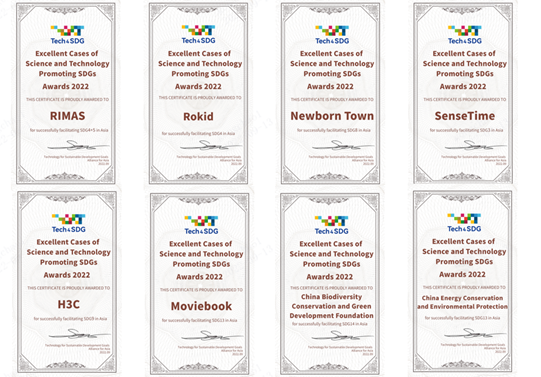
Figure: Nine Excellent Cases of Science and Technology Promoting SDGs Awards 2022
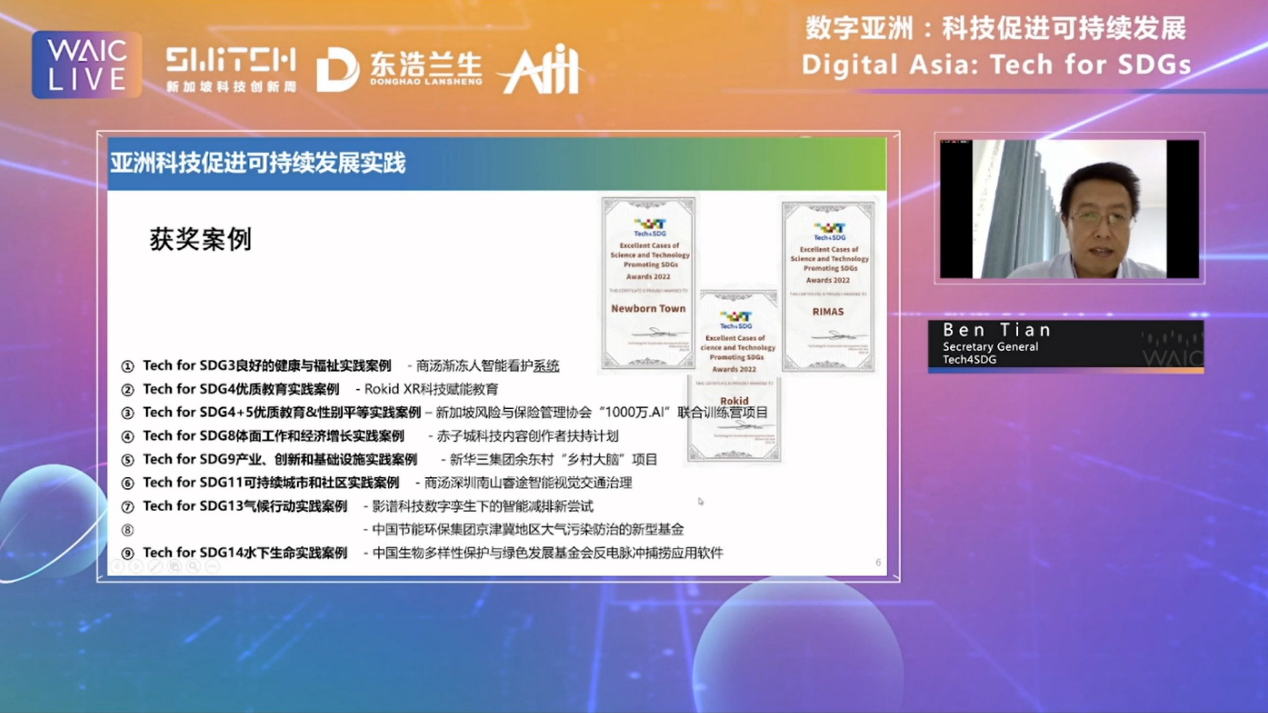
Figure: Award Presentation by Mr. Tian Feng at China-Singapore AI Ecosystem Collaboration Forum
Mr. Tian announced the Tech4SDG Excellent Cases of Science and Technology Promoting SDGs Awards 2022 were awarded to Risk and Insurance Management Association of Singapore (RIMAS), the China Biodiversity Conservation and Green Development Foundation, the China Energy Conservation and Environmental Protection Group Beijing-Tianjin-Hebei Atmospheric Pollution Prevention and Control Fund, Rokid, MovieBook, Newborn Town, H3C and SenseTime.
Award criteria includes the sustainable development goal as the innovation direction, the Asian consensus of "AI ethics of balanced development" as the yardstick and based on Asian scientific and technological talents and engineering advantages, continuing to explore Asia's scientific and technological toolboxes and new industrial models that span the "digital economy gap", "supply chain gap" and "ESG gap", and establish and promote the "Asian model" globally.
Below are the detailed descriptions of the 9 awarded cases:
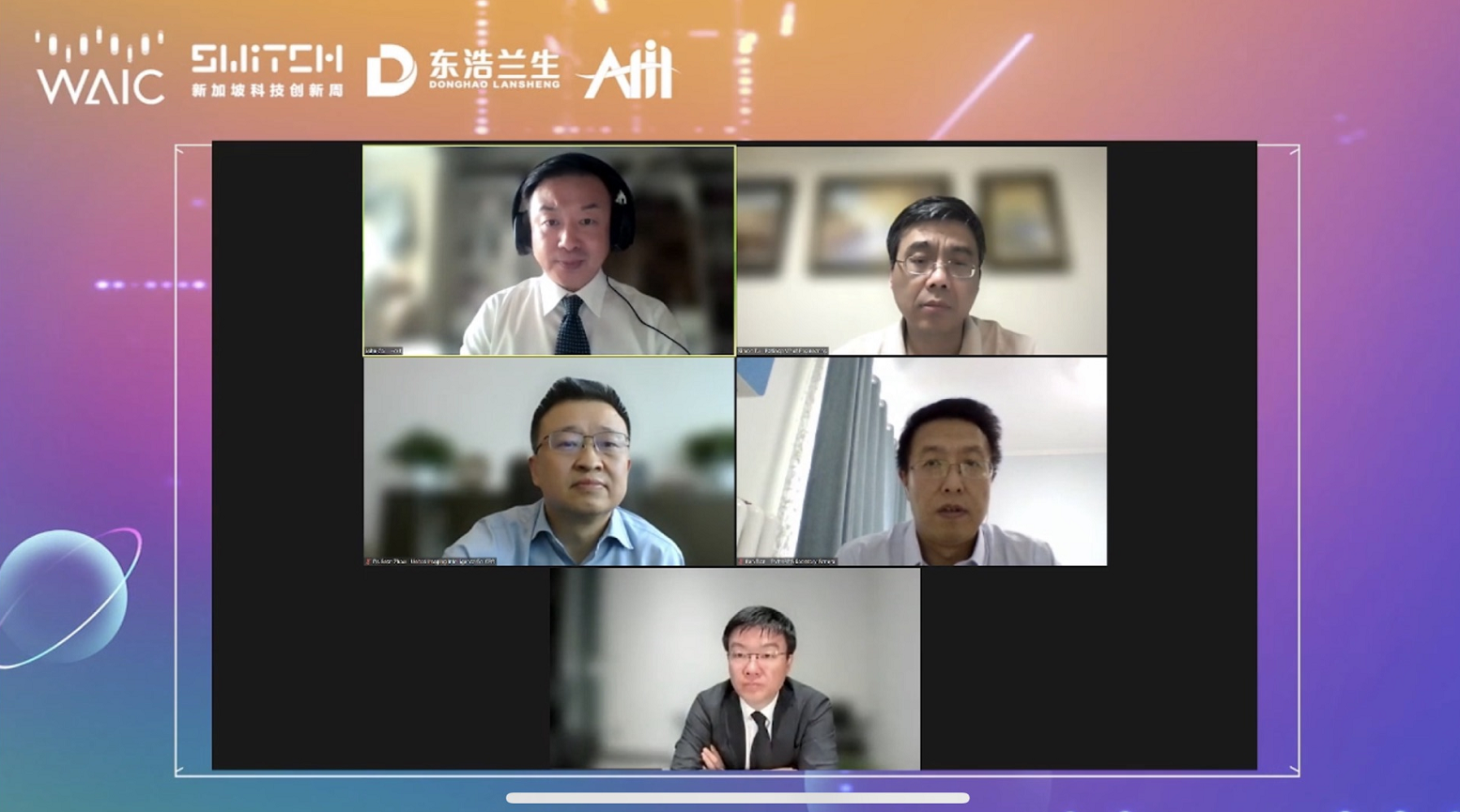
Figure: Roundtable Panel Discussion at China-Singapore AI Ecosystem Collaboration Forum
[Tech4SDG Award Case 1] Excellent Cases of Technology Promoting SDG3 Award: SenseTime, Intelligent Nursing System for ALS patients
SenseTime’s intelligent nursing system provides contactless active calling function for severe patients who lose speech and mobility, by collecting physiological information such as body surface temperature radiation intensity and chest heaving degree of the patients.
The system's computer vision analysis technology can continuously monitor the patient's physiological indicators and waking/sleeping status, count the length of sleep and the number of waking and generate a sleep quality analysis report for the caregiver to adjust the care plan in time.
At present, SenseTime has cooperated with Shaanxi ALS Association to carry out the "AI Warms 'Freezing' Care" campaign and deployed this AI intelligent nursing system for public welfare in several families in Xi'an, Xingping, Weinan and Yanchuan in Shaanxi Province.
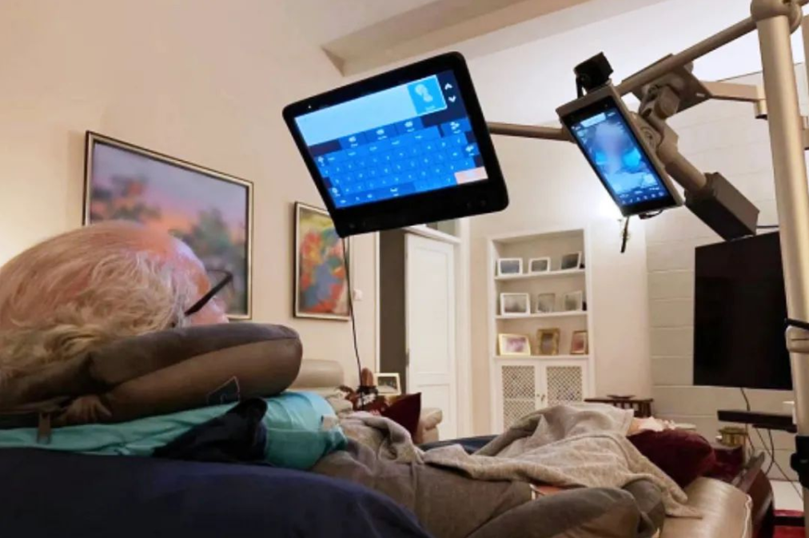
Figure: SenseTime AI intelligent caregiver system to improve the quality of life of patients
[Tech4SDG Award Case 2] Excellent Cases of Technology Promoting SDG4 Award: Rokid Empowers Museum Education with Mixed Reality XR Technology
Responding to the United Nations’ call and the needs of human education development, Rokid tries to apply XR technology to the field of education by launching an integrated platform for educational product design and development, Rokid essential subject tools, exploring educational characteristic scenarios, and building a series of application scenario models to facilitate the application of specific educational knowledge without code.
The abstract and obscure knowledge is presented three-dimensional to provide a rich three-dimensional learning environment, allowing students to discover the knowledge themselves and enhance the learning experience.
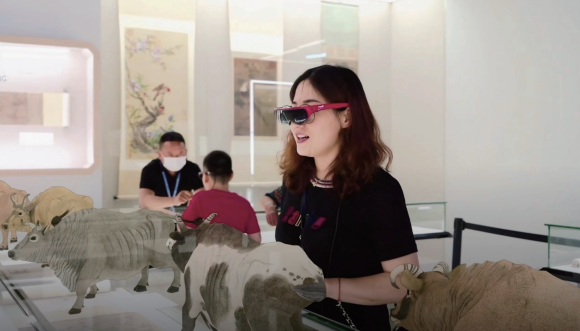
Figure: Rokid Empowering Education with XR Technology
[Tech4SDG Award Case 3] Excellent Cases of Technology Promoting SDG8 Award: Newborn Town, Content Creators Support Program
Newborn Town is a Chinese social company that develops its business while focusing on employee development and caring for the underprivileged, enabling them to earn income and improve their standard of living through social platforms in the difficult environment of the global epidemic.
At the same time, Newborn Town also provides support to content creators in many aspects, establishing multiple operation centres in different regions of the world, recruiting local employees and providing abundant positions. At the same time, Newborn Town focuses on the long-term development of its employees by providing systematic training and improving the welfare system.
[Tech4SDG Award Case 4] Excellent Cases of Technology Promoting SDG4+5 Award: RIMAS, "10 Million.AI" Project
The Risk and Insurance Management Association of Singapore (RIMAS) is committed to advancing the discipline and practice of risk management. It currently engages and registers at least 20,000 people in this partnership and mobilizes at least 10,000 women to actively participate in the field of artificial intelligence.
Among others, RIMAS organizes free joint boot camps with Global AI Hub in Singapore and launched the "10 Million.AI" project. The project focuses on SDG4 (Quality Education) and SDG5 (Gender Equality) and focuses on using technology for sustainable development and gender equality in Asia.
The project aims to bring an equal number of female and male AI professionals into the AI ecosystem to learn the technology. The project aims to bring in 5 million males and 5 million females into the AI ecosystem across participating countries in the world over the next 10 years.
[Tech4SDG Award Case 5] Excellent Cases of Technology Promoting SDG9 Award: H3C, "Village Brain" in Yu Dong Village
Yudong Village has built an integrated intelligent big data platform with Yudong characteristics - the "Future Village Brain" platform, which is based on the multiple needs of villagers and combined with H3C's digital solutions.
The "Future Village Brain" is built around "three mains, five services, and ten scenes, " including rural governance, services, an industrial treasure box, etc. It has effectively opened up the "any and all" channels of grassroots governance and public services in the future community and has initially realized intelligent sharing. The "two veins" of the future community grassroots governance and public services, the initial realization of intelligent shared governance.
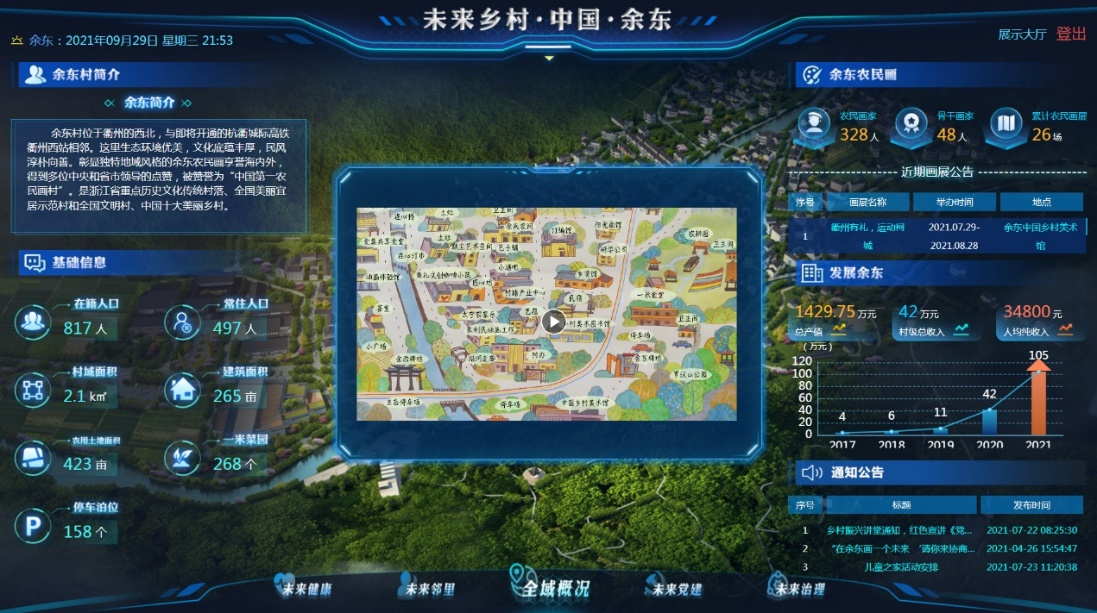
Figure: "Future Village Brain" platform in Yudong Village
[Tech4SDG Award Case 6] Excellent Cases of Technology Promoting SDG11 Award: SenseTime’s SenseFoundry platform for Nanshan, Shenzhen
By using thousands of AI models to analyze the physical boundary data in real-time and transform the data into insights, alerts and actions, SenseFoundry has built a multi-scene, one-stop AI urban governance solution.
It also realized the total complete closed-loop management of AI research and disposal, which has guaranteed the road traffic order and greatly improved the traffic operation efficiency in the urban area of Nanshan District, and the local traffic situation has been significantly improved.
[Tech4SDG Award Case 7] Excellent Cases of Technology Promoting SDG13 Award: MovieBook, A New Attempt at Smart Emission Reduction by Shadow Spectrum Technology
Relying on computer vision, artificial intelligence, digital twin and other technology, MovieBook deeply covers scenes of intelligent media, intelligent science education, digital business, etc., and helps many industries realize intelligent, digital and green upgrades.
In digital city construction, the ADT engine of MovieBook amplifies the value of data and information, makes the physical city and digital city "twin and grow together", and makes the city run smarter and more energy-saving.
At the level of its construction, MovieBook has established the first low-carbon demonstration project of intelligent imaging, a vision production base and a supercomputing centre covering the core nodes of the domestic network.
It is expected that during the 14th Five-Year Plan period, the power consumption of the supercomputing centre will be reduced by 38.7%, and the energy consumption of the visual digital base will be reduced by 75.3%, corresponding to a 43.2% reduction in carbon emissions.
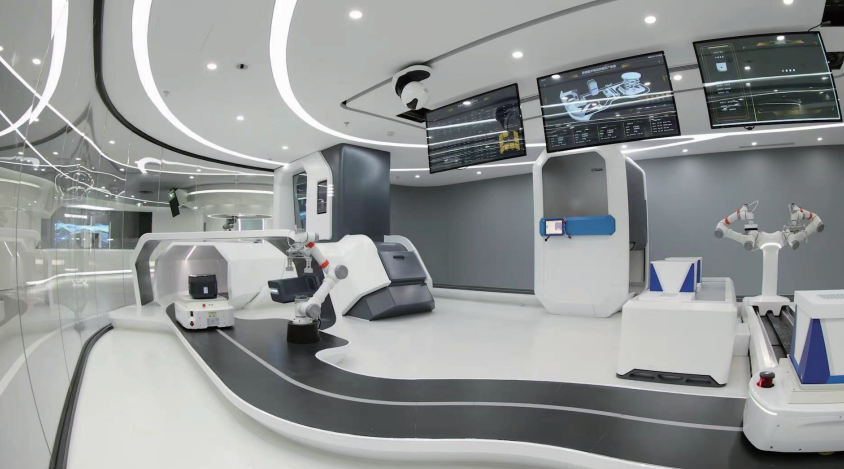
Figure: Digital production line of small commodities in the visual base of MovieBook
[Tech4SDG Award Case 8] Excellent Cases of Technology Promoting SDG13 Award: China Energy Conservation and Environmental Protection Group (CECEP), A New Fund for Air Pollution Prevention in the Beijing-Tianjin-Hebei Region
In 2018, the Asian Development Bank (ADB), the Ministry of Finance of China, and the China Energy Conservation and Environmental Protection Group (CECEP) officially signed an agreement on the CECEP-ADB Beijing-Tianjin-Hebei Air Pollution Prevention and Control Fund Project to innovatively use a $500 million ADB sovereign loan in the form of a fund to set up different funds in the Beijing-Tianjin-Hebei region to promote the application of high technology in energy conservation, emission reduction and climate change mitigation in the industrial, energy and transportation sectors, and to improve air quality.
The ADB Energy Efficiency Fund will be invested on a rolling basis over a 15-year period, with an initial goal of leveraging over $1.5 billion in social capital with a $500 million sovereign loan and investing in energy efficiency and environmental protection across a wide range of sectors and geographies, enhancing the efficiency of capital use and diversifying investment risks.
[Tech4SDG Award Case 9] Excellent Cases of Technology Promoting SDG14 Award: China Biodiversity Conservation and Green Development Foundation (CBCGDF), Anti-Electric Pulse Fishing Cooperation Center
China Biodiversity Conservation and Green Development Foundation (CBCGDF) is a non-profit public welfare foundation, national academic group and environmental organization, that established the Anti-Electric Pulse Fishing Cooperation Center in 2017, aiming to protect local fish, aquatic life and water resources by resisting illegal electric pulse fishing.
Developed by the CBCGDF and a professional software development team, River Eye is a real-time anti-electric pulse fishing monitoring application that combines anti-electric fishing, prevention of illegal fishing, real-time reporting and supervision, hotspot maps, popularization of environment protection and other functions in one, making up for the shortcomings of traditional reporting and evidence collection, as well as the lack of manpower in the fishery supervision department, which makes it difficult to effectively supervise the whole river and lake within the jurisdiction.
At the same time, the River Eye can also show the public a real-time hot map, aquatic animal activity distribution, the latest information and other scientific life tips.
Mr. Tian also delivered a keynote speech on “Digital Asia: Technology for Sustainable Development Goals” at the forum.
Mr. Tian pointed out that Asia, with 60 percent of the world's population, 47.4 percent of the world's GDP, and 52 percent of the world's technological growth, is the most important component of the UNDP Digital Strategy 2022-2025 and a key global force in achieving the 2030 Sustainable Development Goals. It is also a key force in the global effort to achieve the 2030 Sustainable Development Goals.
It is worth noting that in 2020, the year of the COVID-19 outbreak, the volume of Asia's digital economy exceeded US$10 trillion and dominated with a growth rate of 5.2%, which has bred many technological industrial dividends such as artificial intelligence, 5G, mixed reality, Internet of Things, new energy vehicles, energy Internet, smart manufacturing, etc.
Under the framework of RECP (Regional Comprehensive Economic Partnership) and DEPA (Digital Economy Partnership Agreement), if we can take the technological advantages of every Asian country to drive multilateral inclusive
growth and sustainable development of the whole region, accelerate the digital transformation of industry and the green and low-carbon transformation of society, we will realize the inclusive scientific and technological value of “no one left behind” and the “community of human life” that benefits future generations.
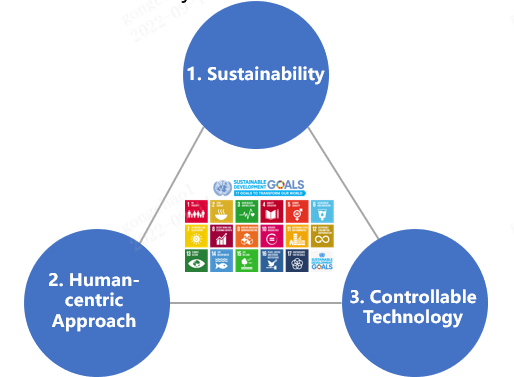
Figure: Three principles of AI ethics for balanced development
For Asian digital economies, ethics is the priority of science and technology innovation. Mr. Tian said that ethics of science and technology is a moral concept and code of conduct to be followed in carrying out multilateral scientific research, technology development and other science and technology activities in Asia, which is an important guarantee to promote the long-term healthy development of Asian digital economies.
For uneven developmental Asia, no development means no well-being, the Asian consensus on ethics of science and technology formed around the United Nations sustainable development is a very valuable spiritual wealth.
Enterprises, universities, governments and the public in Asia should explore, follow and advocate three cornerstone principles of ethics of science and technology – “sustainability", "human-centric approach" and "controllable
technology" in the process of a wide range of scientific research activities and technology applications, so as to integrate the advantages of scale and technology of Asian digital economies to maintain the long-term prosperity and stability of Asia.
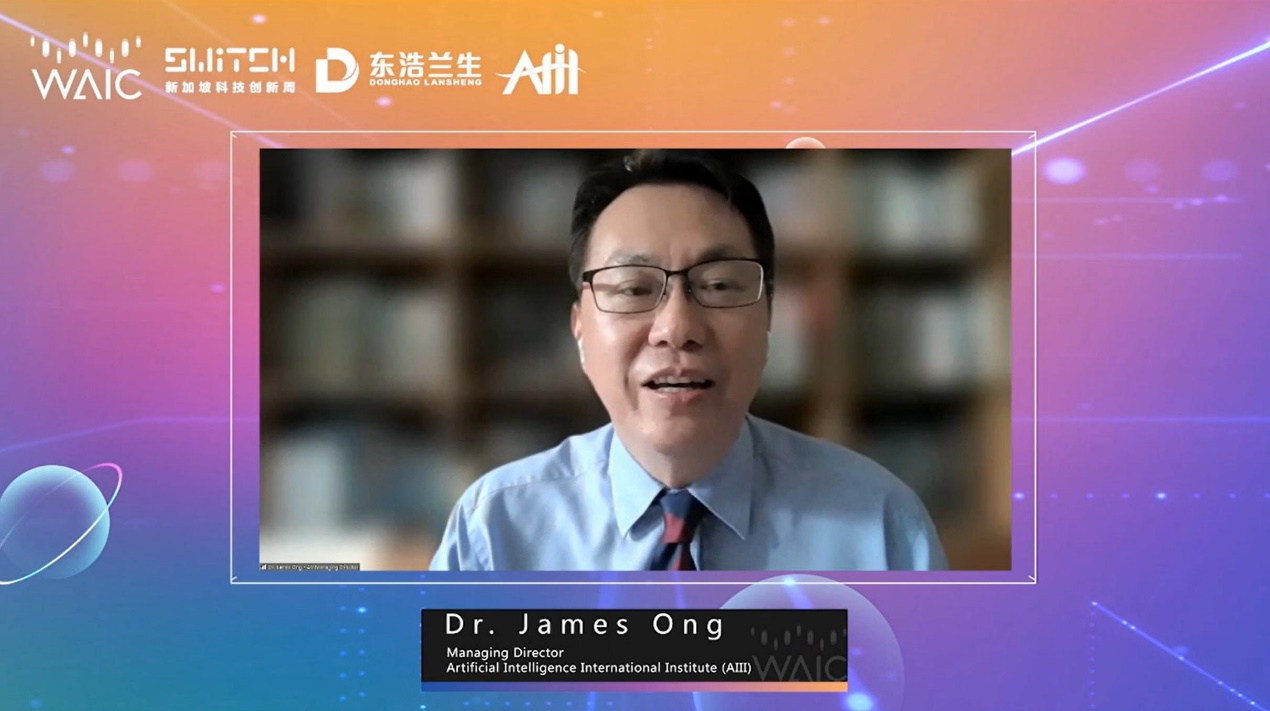
Figure: Speech by Dr. James Ong, Secretary-General of Singapore, Tech4SDG
Dr. James Ong, Secretary General of Singapore of Tech4SDG and Managing Director of AIII, moderated a roundtable discussion on "Mutually Reinforcing China-Singapore AI Ecosystem Towards AI4Good”, emphasizing that promoting AI for good requires the participation of advocates from around the world and multilateral ecological alliances.
Dalith Steiger, Co-Founder of Swiss Cognitive, Oscar Ramos, Managing Partner of SOSV Ventures, Dr. Luo Zhen, Co-Founder and CEO of BaseBit.ai, and Professor Roy Lee of Singapore University of Technology and Design (SUTD), were invited to discuss the interrelationship between AI4Good and Good4AI and how to drive the next generation of human wisdom-based AI.
Finally, Secretary-General Tian released the "Asia Science and Technology for Sustainable Development Goals - Shanghai Initiative" to the world, calling on global universities, think
tanks, institutions, and experts to join the Tech4SDG and contribute Asian power to human well-being as follows:
1 General Goal: Science and technology for achieving Sustainable Development Goals in Asia
2 Consensuses: Human-centric approach and controllable technology
3 Types of Challenges to Address: The digital economy gap, the supply chain gap, the ESG gap
4 Initiatives: Digital infrastructure connectivity, inclusive development of digital public services, digital trust and ethical security, and digital society capacity building






